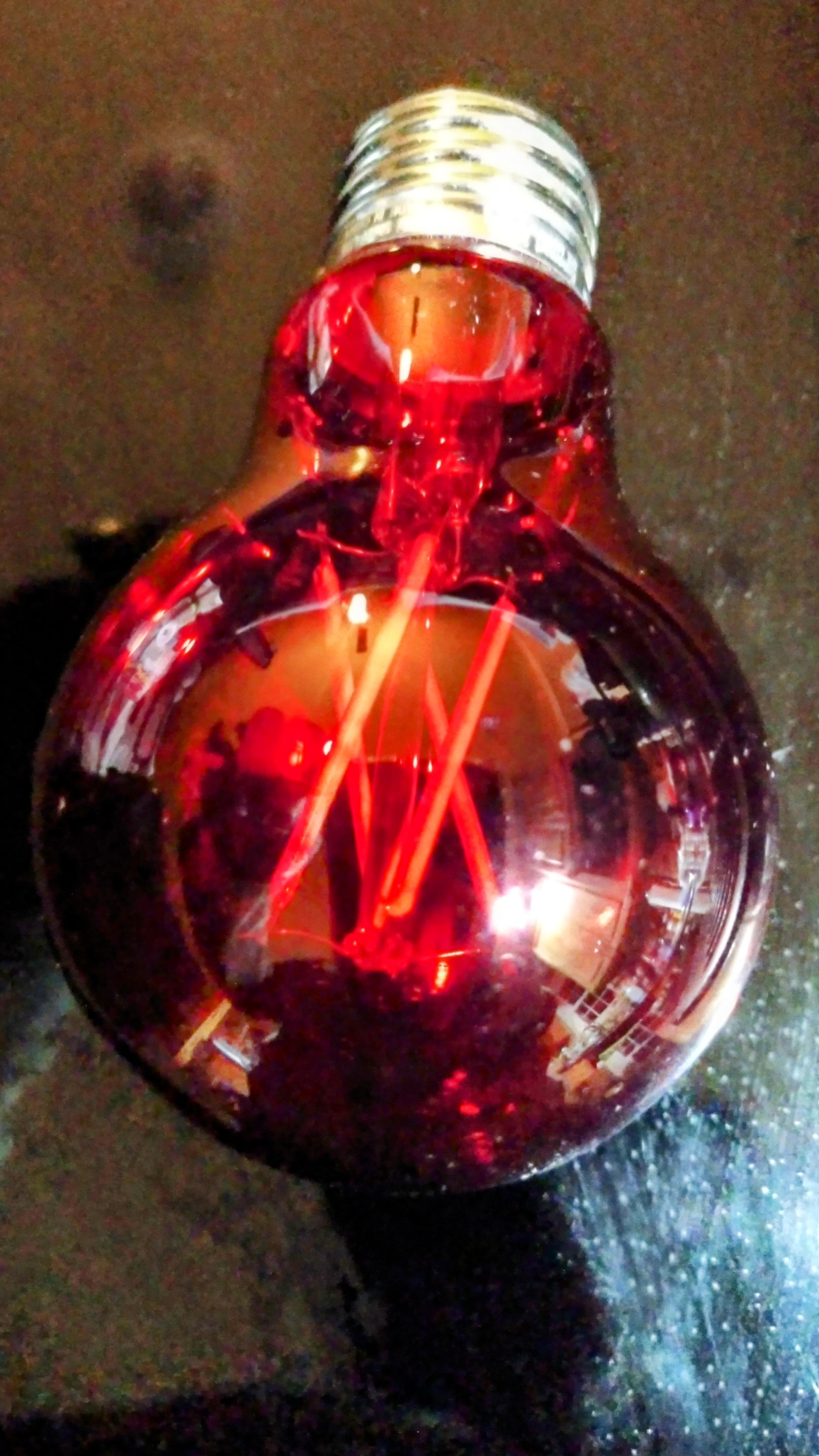How a red light and profanity have helped us in life with Parkinson’s
Finding ways to cope with the (red) spotlight of my husband's disease
Written by |

The 25-watt red bulb in the bedside table lamp gives the room an eerie glow. I chuckle as I remember my husband, Eric, and I giggling when we bought that novelty cherry bulb 15 years ago. At times, we joked it was our “love lamp.” Now, we visit the red-light district every night!
Hold on — I’m not writing a titillating romance or graphic novel featuring a buxom beauty clad in revealing, skin-hugging attire meeting her handsome beau under the glow of a red light for a clandestine rendezvous. In that fictional story, the couple on the eye-catching book cover are oblivious to the hint of trouble lurking in the shadows.
In real life, we understand the challenges and turbulence facing us each day.
That ever-present rosy illuminance flooding our bedroom each night is both a burden and a comfort on our “WE Journey” with Parkinson’s, a progressive, neurological disease.

The red lightbulb inside Jill and Eric’s bedside table lamp. (Photo by Jill Hammergren)
The bulb travels with us, too. Eric uses it as a nightlight for his every-three-hour ritual of forcing himself upright with his once-strong arms, now weakened by Parkinson’s. His legs won’t readily follow the command his brain sends to them. I shield my eyes from the fiery intrusion with a dark, light-blocking, cushioned eye mask. Sometimes it also soaks up the tears I silently cry while my other senses remain aware and alert.
At midnight, 3 a.m., and 6 a.m., Eric strains to sit on the side of the bed. The unhinging rattle reverberates in my ears when he removes the lid covering the heavy-duty plastic portable cooler once used for his daily work lunches. I put two rapid hydration drinks into the overnight chiller every night before he goes to bed, as dehydration is just one of the myriad problems plaguing people with Parkinson’s.
At these regular intervals, Eric takes his dopamine-converting medicine so his mind and body have a chance to fight back against the effects of Parkinson’s. He has both a regular-release and an extended-release dose designed to combat the roller-coaster effect of “on” times — when the medicine enables freer movements of his arms, legs, and overall ambulation, or short, sleepful respites — and “off” times, when nothing he takes or does works.
To cope, I research everything I can about the disease, and what I’ve learned often bubbles up in conversations.
Dopamine is a naturally occurring neurotransmitter in our brains. It helps parents remember to pick up their kids after work. It instills recall of complex learned items necessary for everyday living. It motivates us to exercise — well, sometimes. It rewards pleasurable sensations in the body, especially ones involving ice cream.
Most of us regenerate dopamine through regular activities, nutrients, and food. Not Eric. When the neurologist pronounced that he had Parkinson’s, he said that Eric had likely already lost 80% of his dopamine-producing cells. For the 10 million people worldwide living with the disease, that lost dopamine won’t ever fully come back.
I feel helpless witnessing my husband’s endless, excruciating torment. I hate seeing the anger, frustration, and level of exertion involved in him doing mundane, automatic, and simple tasks. The complexity of Parkinson’s confounds me.
I’m heartbroken witnessing his moment-by-moment struggles, frustrated that I can’t ease them, and angry at how the disease has changed us. I’ll go to the ends of the earth for Eric because I love him, but I hate Parkinson’s.
Coping with the spotlight of Parkinson’s
Eric, my sister, our close friends, and, of course, my former television news cohorts know that I fully embrace, cherish, and use well-placed F-bombs when I passionately express myself. I’m also educated and understand decorum, so I mostly avoid inappropriate outbursts.
But my inner dialogue constantly screams, “F*** Parkinson’s!” It shouts in my head under the red beacon shining on us throughout the night. It fills my ears after I fold Eric’s rollator, lash it with a bungee cord, and then struggle putting it in and removing it from the trunk. It thunders when Parkinson’s prevents Eric from being able to move quickly when we need to get somewhere on time.
Only when I’m alone do I release a loud, free-flowing rant that includes the phrase. Sometimes, I motivate Eric by using the F-bomb and reminding him that he has Parkinson’s, but he is not the disease.
In my professional life, I’m quick-thinking and resourceful, and I find solutions to many of life’s conundrums. But after nearly 10 years as a caregiver, I still haven’t problem-solved a way for Eric and me to live together without the spotlight of Parkinson’s — red or otherwise. But recently, I learned about the positive effects of red light therapy for people with Parkinson’s and its use as a photomedicine for other types of healing, such as the potential reduction of wrinkles and fat.
So yes, Eric and I will visit the red-light district every night!
Note: Parkinson’s News Today is strictly a news and information website about the disease. It does not provide medical advice, diagnosis, or treatment. This content is not intended to be a substitute for professional medical advice, diagnosis, or treatment. Always seek the advice of your physician or another qualified health provider with any questions you may have regarding a medical condition. Never disregard professional medical advice or delay in seeking it because of something you have read on this website. The opinions expressed in this column are not those of Parkinson’s News Today or its parent company, Bionews, and are intended to spark discussion about issues pertaining to Parkinson’s disease.




robert I brownstein
Has anyone used Cala Taps Therapy to help alleviate hand tremors???
I am just signing up for it.
Martin Murphy
Jill, you sound to me like a wonderful partner, carer and human being..
Perhaps one day Parkinson's will heed our command to Fxxx Off andwe can get back the joyful but taken for granted lives we all once had.🙏🏻
Donna Myers
Does using a red lightbulb help? Do you just use in one room & at night? I see there is a helmet for light therapy.
Mary Farnsworth
I put a lot of F bombs out into the universe every day. My husband is My life saver. He understands me and my moods and my fight every day against Parkinson's and all that comes with it. We have to fight because we are worth it 💪
Aziz Husain
Well written. All the best for both of you. i am also a Person with Parkinson's for past 11 years and have made the Parkie disease "my Friend". Has worked so far. Regards.
Nel koopmans
Jill, thank you for sharing. I feel a bit better about using the F word now….the anger rises up so often when I think of what our lives used to look like. I help my husband off the floor at least once a day, and get so frustrated every time. I swear and cuss at this horrible disease. It has taken so much from us, and with no good end in sight, it is a daunting journey that no one but us will ever understand. It affects everything we do. I will never say Parkinson’s is our friend. Friends don’t steal.